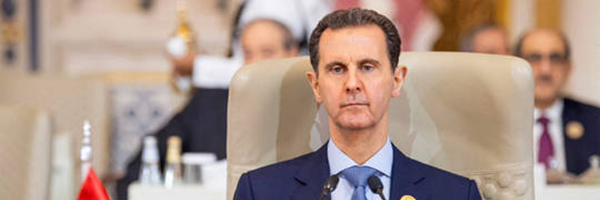The 13-year-old war in Syria holds a warning for Ukraine
 Rachel Marsden, RT, March 31, 2024 —
Rachel Marsden, RT, March 31, 2024 —
Once the US has its claws in a country, it won’t let go easily – and friend or foe, you’ll be left drained and broken.
‘March Madness’ is such a NATO thing. The Western military alliance routinely kicks off conflicts in foreign countries during this particular month, most recently Serbia (1999), Iraq (2003), Libya (2011), and Syria (2011). In that last case, it took a few years for the US to actually invade, but the sanctions and the covert support of anti-government forces began right away.
Remember Bashar Assad, the Syrian president who simply ‘had to go’, according to everyone from then-UK Prime Minister David Cameron, and then-Secretary of State John Kerry, to then-Italian Foreign Minister Paolo Gentiloni Silveri. Whatever happened to Assad, anyway? Turns out that he’s still living a quiet life as president of Syria, and hardly ever finds his name being rolled around in the mouths of NATO’s regime change enthusiasts anymore.
Nearly a decade after mounting a propaganda campaign to support a US-led NATO invasion of the country, the State Department’s special envoy to the conflict, Ambassador James Jeffrey, confirmed in 2020 that the US was no longer seeking Assad’s ouster. Instead, he said, it wanted to see “a dramatic shift in behavior,” evoking Japan’s transformation in the wake of the US dropping a couple of bombs on it during World War II.
That’s quite the policy shift. But it can be explained in exactly the same way that a guy who lusts after a girl and gets shot down suddenly starts telling people that he was never really into her anyway. The attitude changed because Washington had no choice. It had tried just about everything, and failed.
The anti-Syrian propaganda, now virtually non-existent, had for years been relentless. We were told that Assad had simply lost control of the country, and that the US and its allies couldn’t risk having ISIS terrorists running around as a threat and trying to establish a caliphate in Syria because Assad simply wasn’t able to stop them. And whenever he did try, he was conveniently accused of humanitarian offenses. So of course, here comes Uncle Sam to ‘help’ get rid of ISIS, and also Assad – totally without any humanitarian issues, because American bombs aren’t like that.
In the process, the CIA and Pentagon spent billions of dollars training and equipping ‘Syrian rebels’, many of whom bailed out to join other jihadist groups, including ISIS and Al-Qaeda, taking their shiny new weapons with them.
There’s a glaring parallel here with Ukraine, which risks following a similar trajectory with Western involvement and patronage. Even before the current conflict, the CIA-linked Freedom House and others had questioned the extent to which far-right extremists controlled the country. Major Western media outlets were publishing pieces referencing Ukraine’s neo-Nazi problem. So it looks like the same argument could someday be used on Ukrainian President Vladimir Zelensky – that he’s lost control of the country to extremists. And just like the West trained extremists in Syria under the guise of helping, they’ve done the exact same thing in Ukraine by training and equipping the Azov neo-Nazi fighters.
So what happened to those ‘Syrian rebels’, anyway? Since Turkish President Recep Tayyip Erdogan didn’t want a festering jihadist nest right next door, and knowing exactly who those fighters were ever since a NATO base in Türkiye served as a staging ground for the mission to support them, he ultimately airlifted them en masse (an estimated 18,000 of them) to go fight – and die – in another war that NATO had also kicked off in Libya. So, problem solved. But the move raises a question for Ukraine’s future. What are all the Western-trained neo-Nazis going to do when the dust settles in Ukraine, if Russia doesn’t complete its stated mission of de-Nazification?
Former French intelligence chief Alain Juillet has noted that the terrorist troubles in Syria just happened to arise three weeks after Assad’s selection in 2011 of an Iranian-Iraqi pipeline through Syria, rather than a Saudi-Qatari pipeline. The competing pipeline plans would provide a way for either Iran or Qatar to ship natural gas to Europe from the Iranian-Qatari South Pars/North Dome gas field, thus eliminating the high cost of transporting the gas by tankers. So the impetus for intervention was likely economic, as is typically the case. There’s also little question that the West has always wanted to control Syria as a means of containing Iran.
Not only did that plan backfire, but spectacularly so. By 2015, then-US President Barack Obama, who at one point weighed conducting airstrikes on the country, was asking Syrian allies Russia and Iran to work with the US to “resolve the conflict.” He stated that “we must recognize that there cannot be, after so much bloodshed, so much carnage, a return to the pre-war status quo.” The US had gone from guns ablaze regime-change mode, to asking ‘pretty please’ permission of Syrian allies Russia and Iran to help them do it.
Both Iran and Russia had entered the conflict militarily at the request of Assad’s government to help stabilize the country, with Moscow first entering the scene when fighting got too close for comfort to its warm water base for the Black Sea Fleet in Tartus. So basically, Russia was called in to help clean up the mess that the US and NATO had made of the country. And by December 2018, when I asked Russian President Vladimir Putin at his annual press conference whether then-US President Donald Trump was right about ISIS being defeated in Syria, he agreed.
So Trump yanked out the US special forces troops who had been deployed to the country, and declared that America would only keep hanging around where the oil was, in Syria’s eastern oil fields. “Our mission is the enduring defeat of ISIS,” the Pentagon chief said, attempting to reframe Trump’s crass admission. Yeah, right – because it’s not enough that ISIS isn’t really a problem anymore. Uncle Sam has to stick around to make sure that they never come back, ever again. Guess there’s no chance of just heading home and kicking back with a few beers and waiting to see if it’s actually going to be a problem in the future? Nope! Not when so much has been invested in establishing an in-country military footprint that just happens to be right on top of the biggest pile of Syria’s natural resources – the kind that have been the topic of CIA intelligence directorate reports since at least 1986. In December 2023, Syrian Oil Minister Firas Hassan Kaddour evoked the plan to “liberate” the oil fields from US occupation.
Peace in Syria was only possible because of Russia helping to eliminate the troublemakers. Has Zelensky considered what his own future might look like if Russia doesn’t actually succeed in doing the same in Ukraine – and that maybe Russia achieving its goals wouldn’t actually be the worst thing that could happen? The Ukrainian president is already being accused of “consolidating power,” by the State Department-backed media, and has canceled presidential elections. If he doesn’t get a handle on the hoodlums, like the ones in the Ternopol regional council busy giving out awards named after famous Ukrainian Nazis to other famous Ukrainian Nazis, then he’s ripe for the Assad treatment. And if he’s too harsh with them, then he risks being accused, like Assad, of undemocratic heavy-handedness. And at the very least, Ukraine ‘winning’ means that Zelensky is going to have to let his new friends hang out and take what they want for as long as they want to – as the Syria case proves. The West lost in Syria and still won’t go home. Imagine if it had actually been able to have free run of the place. Maybe there’s something worse than a Russian ‘win’ for Ukraine: Permanent occupiers who use friendship as a pretext to stick around and suck the country dry.
*
Rachel Marsden, a columnist, political strategist, and host of independently produced talk-shows in French and English.


